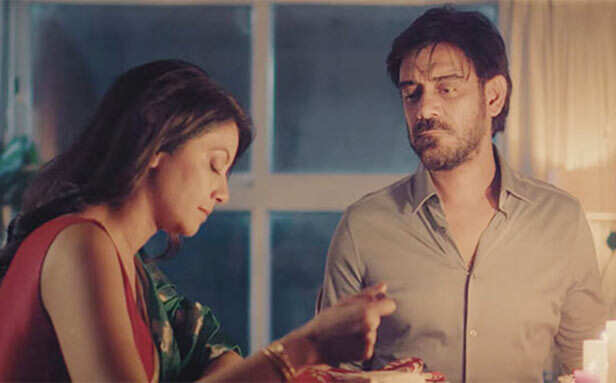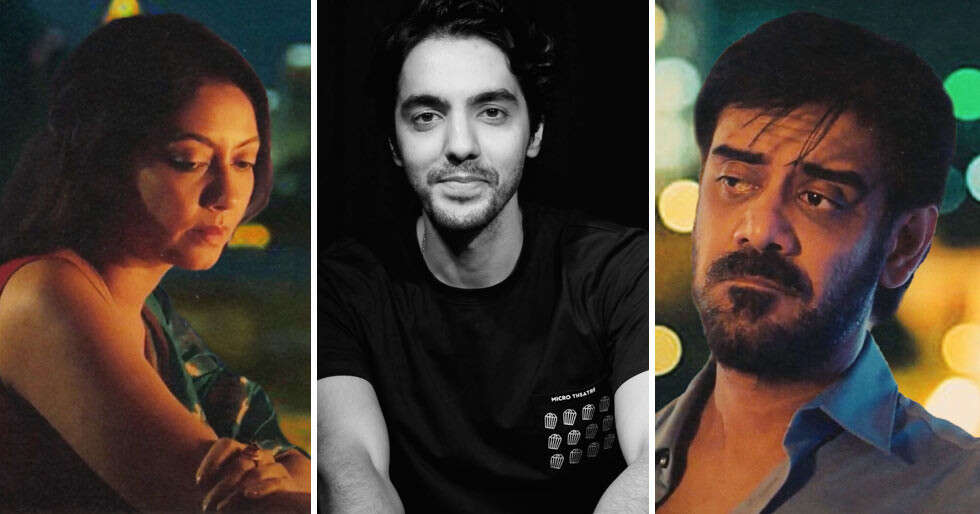At what point did you decide to start making films?
I went for a short course at the New York Film Academy (NYFA) and came back. I’ve been in Mumbai since 2021. So I interned, assisted on films and I was in casting for a year. I felt frustrated because nothing happens at your pace in this industry. You need to have perseverance. At NYFA I was able to do a lot with the opportunities I got and everyone around me was so passionate. I was able to create a lot. When I came back again, I felt like everything was so slow. Either people are too used to it or people have already given up on their aspirations.
When did this idea for First Time come to you?
The idea came to me when I was having a conversation with a friend about relationships. And I said, I feel like most relationships fail because of communication. After a point, everyone gets complacent. You become very presumptuous about the other person because you have known them for so long. In your mind, you start creating questions and answering those questions yourself. So you don’t communicate anything because you think you already know what she or he is going to say. I wanted to do something about that and make it as concise as possible. Then the concept of role play and trying to cheat. A lot of people open up easily if they meet a stranger because they feel like they won’t be judged. So I felt like if they do a role play and they act as if they’re cheating, might as well help them say stuff in the third person and it will be a better way to communicate.
How did Saurabh Sachdeva come on board?
I never had Saurabh in mind for this character because that was way out of my depth to approach someone like him. He wouldn’t do it with a first-timer. So we started building it with two actors who I knew from theatre. And then someone sent the script to Saurabh and he liked it. He called me and asked me to narrate. He said he’ll do it. I thought he was joking because we were all so young but he came true.
What was your experience of directing him?
He’s very open to collaboration. He never felt like a teacher or a senior actor. But it was intimidating for me like what do I say to him? Since I’m the director, everyone was coming to me to ask if the art is right, if the camera is set up right, lights and everything. I was hesitant to direct him. But then he himself broke the ice and said you can tell me anything because this is your story. I felt like his eyes expressed more than his words. I told him also that I want you to see yourself as a romantic because you have so much depth in your eyes. I think that’s what got through to him.

What did Saurabh tell you after winning at the Filmfare OTT Awards?
This was his first Filmfare for a short film and for a romantic character. He told me, everyone was coming up to him and asking him which film/show he won for, Animal or Bombay Meri Jaan? He said, no I’ve done a romantic short film. He felt proud. I felt grateful that I could contribute to his filmography as an actor.
The short is shot very intimately. How did you achieve that?
The whole idea of Shefali and Hussain was that she comes from a well-to-do family and he doesn’t. But he’s trying to make it. For most men, if a woman comes from a privileged background, they feel the need to prove themselves. But the whole point of why they were doing all of this was that she liked him the way he was. In his mind had built a narrative that, “She’s finally with me, but I need to prove myself because I am not at her level.” For the past five years, they weren’t sleeping together or even speaking to each other. They were distant. That was the backstory. For them, having dinner or talking as if they were on a date or even a slight touch felt new because they’ve not done that in a while. It’s an intimate thing so I shot it through close-ups and made it as intimate as possible to showcase their vulnerability.
How did you come up with the idea of dividing the film into chapters based on meal courses?
We wanted food to be a kind of metaphor. It felt apt that it starts with appetisers and main course and dessert. Then there’s a sweet ending or payoff in the form of dessert. Also, food is a good icebreaker. When there’s food on the table, you have to speak, you can’t be aloof. So it’s a very collaborative process with a give and take. Everyone feels lighter once they start eating or drinking and they start opening up. So it was a means to shed off their vulnerabilities slowly. The other thing about the short film format is that you have to condense it, which can be tricky. So the focus on food helped the screenplay fit much better.
Lastly, indie filmmakers today are going to the Cannes Film Festival and other festival circuits. Selling a film feels at once within reach and inaccessible. How do you deal with that as a newcomer?
I’m very happy for Payal Kapadia for All We Imagine As Light, it’s done so well. Independent cinema will always exist. I’m very happy that indie films do well at film festivals or get accolades. I want to do more small, realistic films. As a filmmaker, you also need to be flexible. If you’re not fluid it will hinder your progress. You need to be very open and not so rigid and then everything will happen.
Watch the short film HERE!

